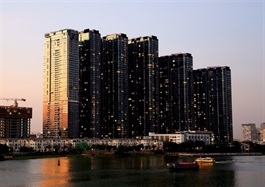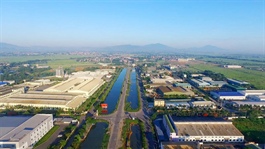Real estate rebound anticipated
Real estate rebound anticipated
Real estate developers are scaling up efforts to bolster sales in a bid to offset the shortfall earlier in the year.

In recent months, a raft of real estate developers began to launch their products plus lucrative incentives to aid the anticipated rebound wave for the rest of this year.
At Tran Anh Group, aside from handing over housing units to customers at their Japanese-style Phuc An Ashita urban complex in the southern province of Binh Duong, the company is pushing sales at their Phuc An Asuka project in Chau Doc city in the Mekong Delta province of An Giang.
Tran Viet Thanh, managing director at the Phuc An Asuka project, revealed that after nearly a year of construction, the project has almost completed. The apartments have acquired full legitimate papers and each plot has its own number.
“In the recent past, Tran Anh has handed over land use and housing rights certificates to the first residents at this urban township. Residents here, apart from locals, come from different neighbouring localities such as Can Tho, Dong Thap, Tien Giang, and even more distant locations such as Ho Chi Minh City,” Thanh said.
One of the highlights of the southern realty market in recent months is that over 2,000 apartments out of a total nearly 3,200 units at Glory Heights bloc within Vinhome Grand Park urban metropolis in Ho Chi Minh City’s Thu Duc city were deposited by customers in just 34 hours, with price ranging from VND42 million-VND80 million ($1,770-$,3370) per square metre.
“The realty market has possibly undergone its most challenging time and began to rebound from May until. Transaction figures in Q2 were better than Q1,” said Can Van Luc, member of National Monetary and Financial Policies Advisory Council, adding that stock market figures indicate that the ticker price of real estate firms have inched up 18 per cent and that of construction firms showed 30 per cent jump in the year to date.
Pham Lam, CEO of DKRA Group, however, held a cautious look, saying that high inflation and interest rates have cast a dent on homebuyers’ purchasing power.
At this point of time, investors are fairly cautious and take a wait-and-see approach. The money flow into the real estate market is therefore not very fruitful, and only those having available cash eagerly join the market.
In respect to the current real estate market current, Nguyen Van Hau, CEO of Asian Holding, assumed that the market would not boom as previously because the ‘conservative’ sentiment still dominates investor mindset.
Producers have faced mounting hardships, leading to falling incomes. This has affected the cash flow into the real estate market.
In addition, real estate firms have also encountered multiple challenges. Besides legal issues, other factors on finance and high-quality human resources are roadblocks hampering business development.
“Currently, our firm focuses on recruiting manpower for training, actively preparing to expedite our business plan in 2024. Quality manpower is decisive to business success,” Hau said.
With expectations that roadblocks will be quickly removed, Nguyen Dinh Trung, chairman and CEO at Hung Thinh Corporation, proposed banks flexibly revise lending requirements based on specific periods.
This will help increase liquidity in the market as well as create more jobs and incomes for people.
“In addition, relevant management agencies such as the Ministry of Natural Resources and Environment, the Ministry of Finance and the Ministry of Construction need to consider using official land prices (called the K coefficient), as with this measure, businesses might calculate their actual land rent before making a decision, and relevant management agencies would find it easier in land price fixing,” Trung said.





















